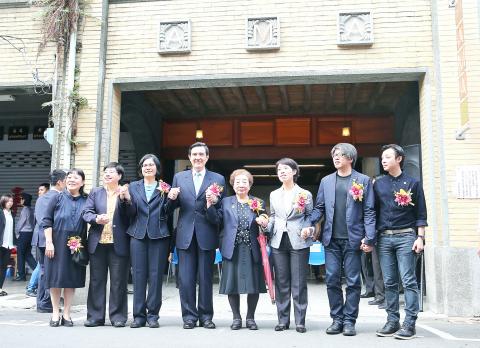The plaque on a museum dedicated to Taiwanese “comfort women,” who were forced into sexual slavery by the Japanese Imperial Army during World War II, was unveiled on Tuesday, International Women’s Day.
It was a momentous day in the history of the women’s rights movement in Taiwan, Taipei Women’s Rescue Foundation chairwoman Huang Shu-ling (黃淑玲) said.
After more than a decade, the foundation has realized its dream of establishing a museum in memory of Taiwanese comfort women, Huang said at a ceremony in Taipei, which was attended by President Ma Ying-jeou (馬英九) and Chen Lien-hua (陳蓮花), a former comfort woman.

Photo: CNA
The Ama Museum promotes peace and human rights, Ma said, adding that it opens a new chapter in the history of Taiwanese comfort women.
That part of history must be preserved not for revenge, but to reveal the truth and remember the lessons of the war, Ma said, urging Japan to do more in dealing with the issue of comfort women.
Chen, 92, said she was grateful to see the establishment of the museum.
She is one of three surviving Taiwanese comfort women who have spoken openly about their suffering during the war.
In response to questions about Japan’s handling of the issue, she said that the Japanese government has not responded to their demands, adding that she feared that she might not live long enough to see the day when Japan issues a formal apology and offers compensation.
“Ama” means “grandmother” in Hoklo (commonly known as Taiwanese). The foundation calls former comfort women “ama,” as most of them are in their late 80s or early 90s.
The foundation said it hopes that the museum would become a home for comfort women and a place where they would always be remembered. One of the goals of the foundation is to inform future generations about the history of comfort women and women’s rights, it added.
Housed in a two-story building and covering 150 ping (496m2), the museum is to feature a permanent exhibition on Taiwanese comfort women, displaying photographs, documents and videos related to them, as well as the exchanges over the past two decades between foundation members and Taiwanese comfort women, the foundation said.
In addition to the exhibition, the foundation is to organize workshops and seminars at the museum on topics such as human rights and sexual abuse, it added.
The museum is located in a renovated building in Taipei’s historic Dadaocheng (大稻埕) area and its formal opening is scheduled to take place in September, the foundation said.
The opening is to mark the foundation’s 25 years of efforts in helping comfort women cope with their mental anguish and seek justice and compensation from Japan. Over the past two decades, it has collected many first-hand accounts since it began interviewing the women, the foundation said.
More than 2,000 Taiwanese women were forced into sexual slavery by the Japanese military during the war, according to the foundation.

A magnitude 4.9 earthquake struck off Tainan at 11:47am today, the Central Weather Administration (CWA) said. The hypocenter was 32.3km northeast of Tainan City Hall at a depth of 7.3km, CWA data showed. The intensity of the quake, which gauges the actual effect of a seismic event, measured 4 in Tainan and Chiayi County on Taiwan's seven-tier intensity scale, the data showed. The quake had an intensity of 3 in Chiayi City and County, and Yunlin County, while it was measured as 2 in Kaohsiung, Nantou County, Changhua County, Taitung County and offshore Penghu County, the data showed. There were no immediate reports of

‘DENIAL DEFENSE’: The US would increase its military presence with uncrewed ships, and submarines, while boosting defense in the Indo-Pacific, a Pete Hegseth memo said The US is reorienting its military strategy to focus primarily on deterring a potential Chinese invasion of Taiwan, a memo signed by US Secretary of Defense Pete Hegseth showed. The memo also called on Taiwan to increase its defense spending. The document, known as the “Interim National Defense Strategic Guidance,” was distributed this month and detailed the national defense plans of US President Donald Trump’s administration, an article in the Washington Post said on Saturday. It outlines how the US can prepare for a potential war with China and defend itself from threats in the “near abroad,” including Greenland and the Panama

The Chinese Nationalist Party (KMT) is maintaining close ties with Beijing, the Democratic Progressive Party (DPP) said yesterday, hours after a new round of Chinese military drills in the Taiwan Strait began. Political parties in a democracy have a responsibility to be loyal to the nation and defend its sovereignty, DPP spokesman Justin Wu (吳崢) told a news conference in Taipei. His comments came hours after Beijing announced via Chinese state media that the Chinese People’s Liberation Army’s Eastern Theater Command was holding large-scale drills simulating a multi-pronged attack on Taiwan. Contrary to the KMT’s claims that it is staunchly anti-communist, KMT Deputy

RESPONSE: The government would investigate incidents of Taiwanese entertainers in China promoting CCP propaganda online in contravention of the law, the source said Taiwanese entertainers living in China who are found to have contravened cross-strait regulations or collaborated with the Chinese Communist Party (CCP) could be subject to fines, a source said on Sunday. Several Taiwanese entertainers have posted on the social media platform Sina Weibo saying that Taiwan “must be returned” to China, and sharing news articles from Chinese state media. In response, the Mainland Affairs Council (MAC) has asked the Ministry of Culture to investigate whether the entertainers had contravened any laws, and asked for them to be questioned upon their return to Taiwan, an official familiar with the matter said. To curb repeated